Did you know that a recent survey shows 58% of cat owners have tried grain-free cat food for their furry companions? Grain-free cat food seems to have become quite the trend in the pet food industry.
But is it worth the hype? Should you jump on the bandwagon and switch your cat’s diet to grain-free? In this article, we’ll explore the benefits and drawbacks of grain-free cat food and help you decide if it’s the right choice for your feline friend.
As a responsible pet owner, you want to provide the best possible nutrition for your cat. After all, they rely on you for their every need. With so many different types of cat food available, knowing which one to choose can be overwhelming.
Grain-free cat food has been marketed as a healthier option, but is it? Let’s dive deeper into this popular trend and see if it matches its reputation.
Key Takeaways
- Grain-free cat food can benefit cats with grain allergies, improving digestive health and promoting a shiny coat.
- However, it can also lead to nutritional imbalances, digestive issues, and weight gain due to higher fat and calorie content.
- Choosing high-quality protein sources and avoiding fillers like corn gluten or soybean meal is important.
- Consult a veterinarian to determine whether grain-free cat food is the right choice for your cat, as a grain-inclusive diet may be a better option for some cats.
What is Grain-Free Cat Food?
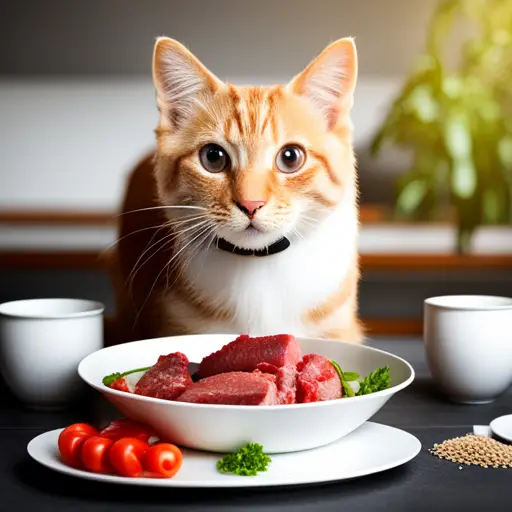
If you’re wondering what grain-free cat food is, it’s a cat food that doesn’t contain grains like wheat, corn, or rice. It’s becoming increasingly popular among cat owners who want to provide their feline friends with a more natural and nutritious diet.
However, not all grain-free cat food is created equal. When shopping for grain-free cat food, there are a few things you should look for to ensure that you’re getting a high-quality product.
Firstly, check the ingredients list. Look for high-quality protein sources like chicken, turkey, or fish as the first ingredient. Avoid products containing by-products or fillers like corn gluten meal or soybean meal. These ingredients are not nutritional and can even harm your cat’s health.
Additionally, look for products that contain healthy fats, like salmon oil or flaxseed. These fats are essential for your cat’s overall health and well-being.
Why Some Cat Owners Choose Grain-Free Cat Food
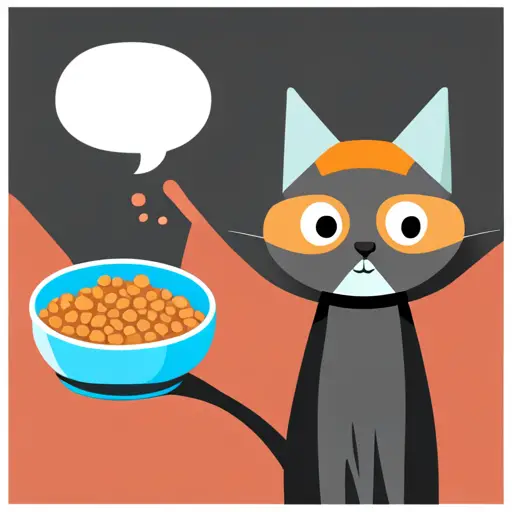
You might wonder why some cat owners go against the grain and opt for a different approach to nourishing their feline friends. Here are three reasons why some cat owners choose grain-free cat food:
- Allergies: Some cats suffer from grain allergies, which can lead to digestive problems and skin irritations. By eliminating grains from their diet, these cats can experience relief from these symptoms.
- Nutritional Value: Grain-free cat food is often made with higher-quality meat, fish, and vegetables. These ingredients provide a balanced and nutritious diet for cats, which can lead to better overall health.
- Cost Comparison: While grain-free cat food may be more expensive than traditional cat food, it can also be more cost-effective in the long run. Because grain-free cat food is made with higher quality ingredients, cats may require less food to feel full and satisfied, which can ultimately save money on food expenses.
When considering grain-free cat food, it’s important to weigh the potential benefits against the cost. While it may be more expensive than traditional cat food, the nutritional value and potential health benefits may make it worth the investment.
Potential Benefits of Grain-Free Cat Food
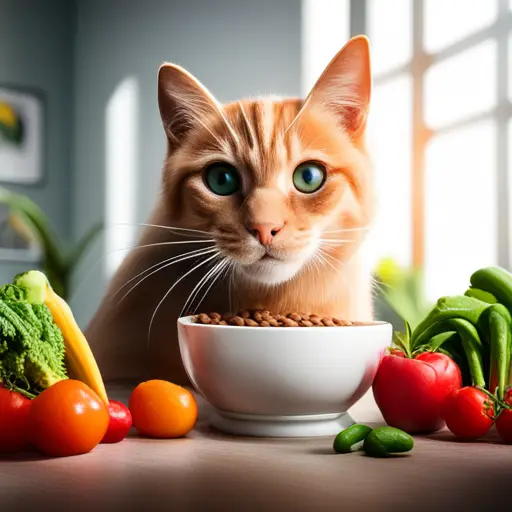
As a responsible pet owner, it’s important to understand the potential health benefits of opting for a more nutrient-rich diet for your feline friend. Grain-free cat food has become increasingly popular in recent years and for good reason.
One potential benefit is improved digestive health. Cats are obligate carnivores, requiring a high-protein diet to thrive. Grain-free cat food often contains more meat-based protein sources, which can be easier for cats to digest and absorb.
Another benefit of grain-free cat food is improved coat quality. Many grain-free cat foods contain ingredients such as omega-3 and omega-6 fatty acids, which are essential for healthy skin and fur.
These fatty acids can help reduce inflammation and improve skin moisture, producing a shiny, healthy coat. Additionally, since many grain-free cat foods are made with high-quality protein sources, they can provide your cat with the necessary amino acids to maintain healthy skin and coat.
Choosing a grain-free cat food may provide your feline friend with various benefits, including improved digestive health and a shiny, healthy coat.
Potential Drawbacks of Grain-Free Cat Food
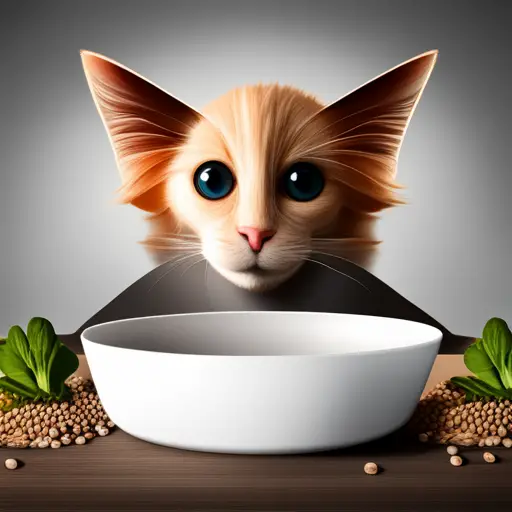
Interestingly, some veterinarians have raised concerns about the potential drawbacks of a grain-free cat food diet. While it may offer benefits like reducing allergic reactions and aiding weight management, it may also cause digestive issues and nutritional imbalances.
Here are some potential drawbacks of feeding your cat a grain-free diet:
- Digestive issues: Cats need fiber to aid digestion and prevent constipation. Without grains, your cat may not get enough fiber, leading to digestive issues like diarrhea, vomiting, and even pancreatitis.
- Nutritional imbalances: Grains provide important nutrients like vitamins, minerals, and amino acids that your cat needs to maintain a healthy diet. Without these nutrients, your cat may develop nutritional imbalances, leading to health problems like heart disease and kidney failure.
- Cost: Grain-free cat food can be more expensive than regular cat food, which can be a challenge for pet owners on a budget. While it may offer benefits, but it is important to weigh the potential drawbacks before switching.
Is Grain-Free Cat Food Right for Your Cat?
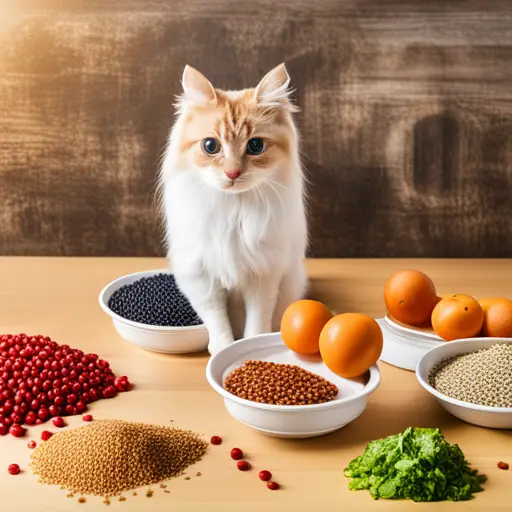
Determining whether a grain-free diet suits your feline companion requires careful consideration of their health needs and dietary requirements. While grain-free cat food may seem like a healthy option, it’s important to note that it has potential health risks.
Some cats may develop food sensitivities or allergies to the alternative ingredients used in grain-free food, such as peas, lentils, and potatoes.
Some grain-free cat foods may contain higher fat and calories, leading to weight gain and other health problems.
Before switching to grain-free cat food, it’s important to consult with your veterinarian to determine whether it’s the right choice for your cat. They can help you evaluate your cat’s health and dietary needs and recommend alternative options.
A high-quality, grain-inclusive diet may be the better choice for some cats. As a responsible pet owner, you must make informed decisions about your cat’s health and well-being, including choosing the right food.
Conclusion
So, is grain-free cat food worth the hype? Ultimately, it’s up to you as the cat owner. While there are potential benefits to feeding your cat a grain-free diet, such as improved digestion and fewer allergy symptoms, there are also potential drawbacks, such as a lack of necessary nutrients and higher costs.
Before deciding, it’s important to consult with your veterinarian and research different brands and ingredients. Not all cats will benefit from a grain-free diet; some may even require grain for optimal health.
So, take the time to weigh the pros and cons and make an informed decision that’s best for your feline friend.
